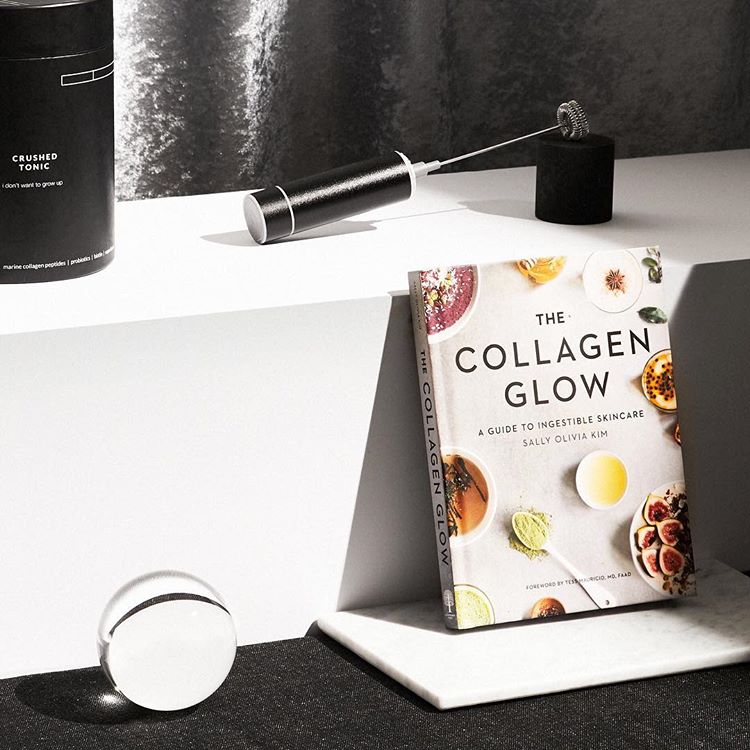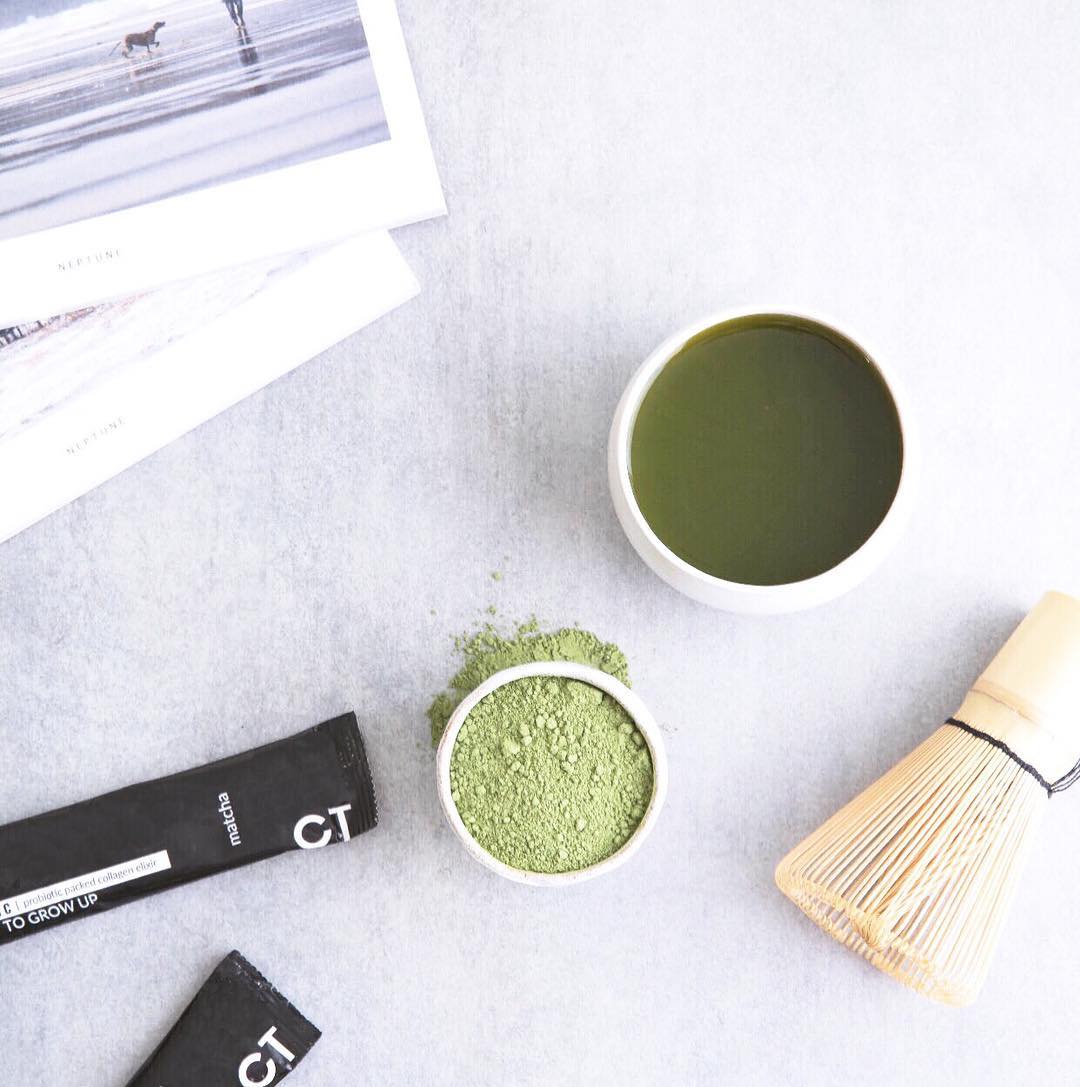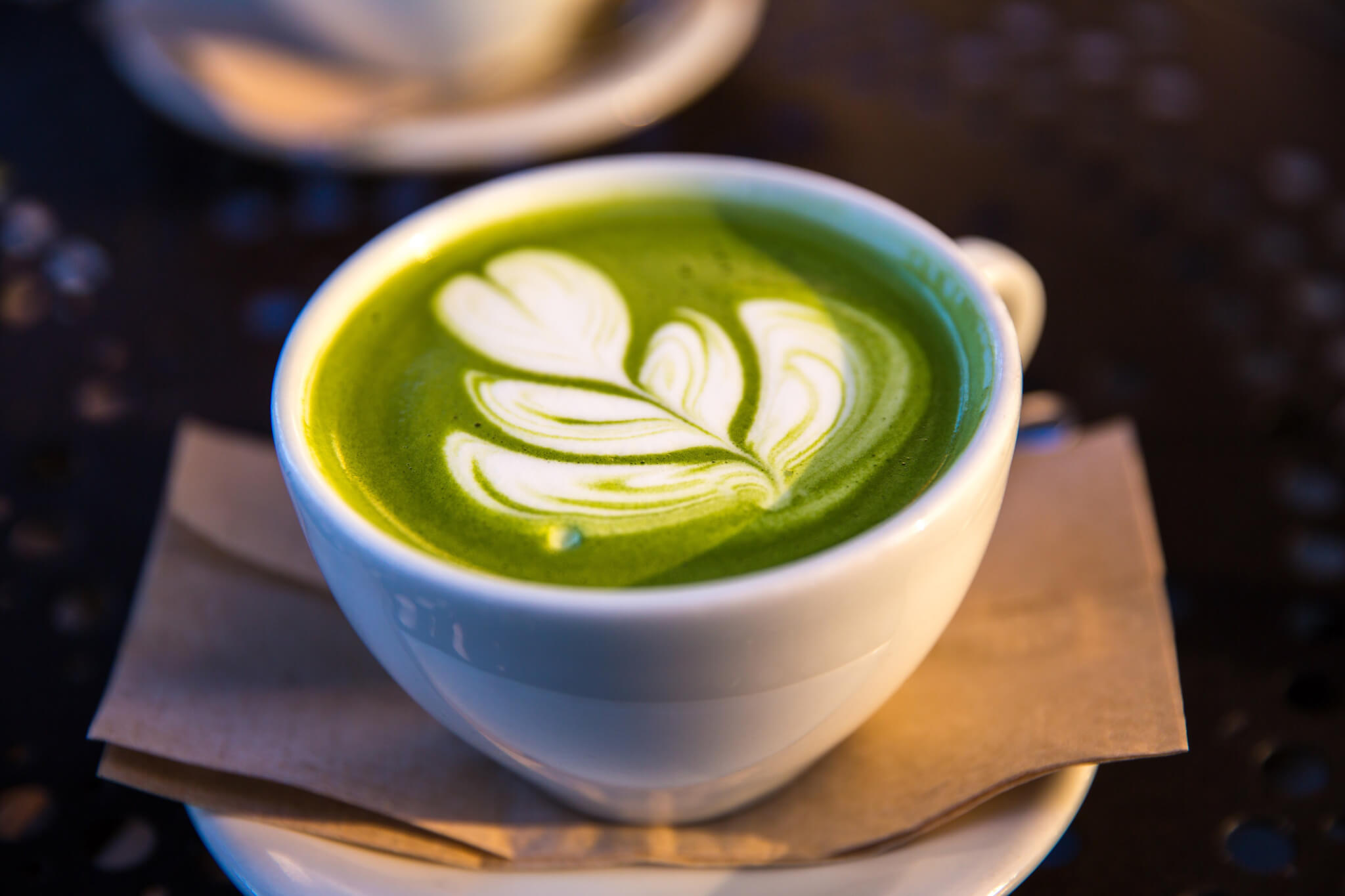Collagen is not a new discovery in the quest to find the fountain of youth by any means but has definitely grown in popularity over the recent wellness supplement boom. A spike in wellness and a sudden interest by all genders in anti-aging has led to a lot of research to be done on beauty supplements like collagen and its efficacy.
Though, I don’t think there is enough hype around collagen given its benefits–there are SO many. Sure, there are plenty of people hopping on the beauty train–men and women included–but do we know enough about collagen to be convinced to try it out?
Is collagen a miracle ingredient? Let’s unpack that a bit.
To get the lowdown on collagen, we sat down with collagen expert, Sally Kim, founder & CEO of Crushed Tonic, and author of The Collagen Glow. Crushed Tonic is an anti-aging collagen drink mix that’s carried in Earthbar/Equinox, Sephora, KITH, Free People, and Anthropologie–to name a few.

She says that topical collagen is not good enough to see improvements in the skin–nurturing the skin with collagen needs to happen from the inside out. That’s why she created Crushed Tonic, which is formulated with marine-sourced collagen, cultured probiotics, 100 mcg of biotin and other superfoods clinically-proven for health benefits for skin, hair and whole-body health. Sally explains that each tonic, AKA “crush” is flavored with amazing organic superfoods like matcha, turmeric, and lucuma. Best of all, you just add water or your favorite nut milk.
Meet Sally–the founder and CEO of Crushed Tonic and author of her book, The Collagen Glow.

Can you tell me about how the idea for Crushed Tonic began?
Sally: My obsession with collagen began when I got burned from a cooking accident.
The oil melted the skin off both of my arms instantly, and I had to turn to a ton of prescription ointment and silicone patches only to find out none of it really did much for me. Unimpressed by the options out there, I ended up turning to the internet to find ways to heal my skin.
After some research, I discovered that ingesting collagen was extremely beneficial for our skin (and hair, bones, joints, the list goes on). I was super fascinated, especially because I always thought collagen was something that was topically applied or injected–and started drinking it every day. After just a couple of weeks, I saw incredible changes not just on my burns, but all of my skin, head to toe, and also my hair.
Turns out, collagen is something that’s in our own bodies–actually, the most abundant substance in our bodies second to water–and our bodies stop producing it as much when we are in our mid 20’s. Drinking extra collagen, however, offsets that decline, restoring your skin and hair to its natural beauty.
I then tried to evangelize it to my aging parents and family, and this was where I saw the problem. No one wanted to take collagen as often as I did, for how it tasted (to be fair, most collagen powders do have an unpleasant taste–often gamey tasting, like any other protein powders are); and had I not been burned, I probably wouldn’t have drunk it either.
Knowing how beneficial collagen is, I HAD to have my parents take it. So I began to flavor each mix with specific superfoods that they liked so they would drink the collagen with the beverages they were already drinking every day anyway (matcha for my mother, coffee for my dad, and hot cocoa for my brother).
After tasting and testing for months, getting it so that the collagen flavor was undetectable, and hearing my friends and family rave about how amazing it tasted–that’s when Crushed Tonic was born.
My mission is to bring more focus and attention to supplements, specifically ingestible beauty (AKA beauty from within)–the concept that when it comes to healthy skin and hair, what you put in your body is just as important, if not more important than what you put on it.
It’s difficult for anyone to consume ALL the recommended nutrition needed daily, which is why vitamins and supplements are so great for filling in those gaps in your diet.

Photo by Crushed Tonic via Instagram
What is Collagen?
S: Collagen is a natural protein that our bodies produce. Fun fact: collagen is the most abundant substance in our bodies after water!
Collagen is a major structural component of the human body (different types of collagen make up our skin, bones, muscles, and joints) and we depend on collagen to keep our skin plump, hair strong, bones healthy, joints lubricated, and digestive system working smoothly.
Why do we need to take collagen?
S: Though our bodies are able to produce ample amounts of collagen when we are young, unfortunately, sometime after the age of 25, our bodily production of collagen begins to decline at a rate of 1.5% per year (in addition to the decline in the quality of the produced collagen). By our mid-40’s, our collagen levels may have fallen by as much as 30%.
Without collagen, our cells lose structure, increasingly becoming weaker, stretchier, and thinner–and essentially, this decline is the true cause of many of our skin woes like wrinkles, fine lines, dark circles, dry skin, and cellulite.
What are the benefits of collagen?
S: Ingesting collagen helps us keep our skin supple, elastic, and hydrated. With more collagen to lock in the moisture within every cell, our skin will stay hydrated and taut.
Collagen is a miraculous superfood that is good for you, from head to toe, though the industry emphasizes collagen’s benefits on skin*. Because collagen is a complex protein that contains EIGHTEEN out of the twenty existing amino acids found in our bodies, these eighteen amino acids, when ingested, support all of the different various functions of our body in different ways: our skin, hair, brain, bones, teeth, nails, heart, digestion, muscles, weight, mood, virility and even sleep.
*After just 12 weeks of daily consumption (10g/day), surveyed respondents in our focus group noticed a decrease in wrinkles, increased skin hydration, increased skin firmness and decreased joint pain.
Here are some benefits to taking collagen I’ve listed in my book:
- Skin benefits
- Diminished dark circles and puffiness around the eyes
- Minimized appearance of pores
- Reduction in the visibility of cellulite
- Diminished visibility of scars
- Overall restored brightness of skin
- Overall more hydrated skin
- Detox & Improving Liver Health
- Hair
- Brain Health: Mood, Anxiety, and Sleep
- Joints
- Bones and teeth
- Nails
- Heart Health
- Digestion
- Muscle tissues, ligaments, and tendons
- Metabolism and weight loss
What is your philosophy on beauty and wellness?
S: I’ve come to realize that I am the happiest when I am the healthiest–mentally and physically. I also look my best when I’m the happiest so for me, healthy is where I invest the most. When it comes to healthy food, supplements, fitness, and mental health, there is no such thing as too expensive or too often.
That’s why I love my LARQ bottle so much–it helps me drink so much water as it purifies tap water, and when I’m at the airport, I can use it at water fountains and not have to spend $10 on bottled water!
What are some of your favorite ways to take collagen?
I like to make lattes as soon as I wake up! I like to warm up oat milk and add the matcha crush (essentially 1 serving of organic matcha, 10g of collagen, 1 billion CFU of probiotics, and 1000 mcg of biotin). I’ll use an electric whisk to mix it so there are no clumps.
How do you ensure the absorption of collagen?
I recommend ingesting collagen in the morning, before having any other foods, when there’s nothing in your stomach so your body can digest the collagen before anything else. You want the collagen to be in your bloodstream in its present form, not digested by stomach acid and mixed in with other food during the digestion process. You’ll also see that this helps with other things as well–like keeping you full and feeling satiated until lunch!
I also like to eat fruits with vitamin C, like oranges or tangerines since vitamin C is known to boost collagen production! According to the Linus Pauling Institute researchers at Oregon State University, vitamin C has a distinct role in collagen synthesis; without vitamin C, our body is slower in healing wounds and producing collagen. Thus, it makes sense to have some vitamin C added to your collagen supplement.
What is the recommended potency or daily value of collagen to see benefits of collagen?
This varies per person, age, and his or her body type, the health of their kidneys (too much protein can lead to kidney stones), and also depending on what collagen they are drinking–or how bioavailable the collagen is.
Going overboard with anything can be harmful–even drinking too much water can be harmful to you! So I recommend that those starting to take collagen ease into the routine by taking 5g for a few days first, and then 10g, and then cap it at 30g.
Do results vary from taking collagen? If so, how does it vary? Does it depend on age, diet, or lifestyle?
Yes! It’s very important to note that not everyone will see the same results that I have seen given the differences in lifestyle and diet. Also, it took more than 2 years of drinking collagen DAILY for my skin and hair to get to where it is now!
Some people may take longer to see results, especially if they are smoking or drinking alcohol excessively. The benefits of collagen will definitely be harder to see (as those habits will erode your collagen levels).
When it comes to age, it is better to start taking collagen earlier than later, as you will be taking a more preventative approach; however, collagen doesn’t discriminate!
I keep a gluten-free and dairy-free rule and do not consume anything “white” very often. White is an unnatural color for food: sugar, flour, cheese, and milk. I also recommend staying away from processed foods as much as you can; long story short, they’re bad for you.
If you were considering taking collagen as a supplement to your diet–whether to prevent signs of aging, to reduce them, to encourage joint health, or even to reduce the visibility of scars–I hope you learned a thing or two about it to help you make the best decision for your lifestyle!
Results of taking collagen supplements may vary. Consult your doctor or physician before taking any supplements.
This post is not sponsored.
